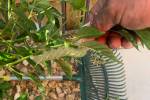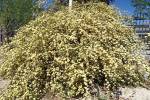Groom, feed your roses to prepare for winter
Here are some questions I dealt with this week:
Question: How do I prepare my roses for winter?
Answer: Begin by grooming them:
■ Remove all fading flowers.
■ Get rid of dead or diseased wood.
■ Do away with the top third of the bush.
■ Clean out all twiggy stuff.
■ Cut out crisscrossing canes to stimulate new canes.
■ Make all final cuts just above outside-facing leaves.
Here's a recipe for feeding roses this fall:
■ Irrigate bushes before applying fertilizer.
■ Apply an all-purpose rose fertilizer.
■ Add a cup of bone meal soil sulfur.
■ Add a third of a cup of Epsom salts and a third of a cup of cottonseed meal.
■ Distribute nutrients around each bush and scratch into the soil.
■ Do not feed roses after Halloween to avoid cold injury.
■ Finally, irrigate nutrients into the root zone and flush away salts.
Q: We're from New York and want to know if irises grow here?
A: They do great and are drought tolerant. The secret is planting them in an enriched soil before Halloween. They need a half to full day of sun.
Q: How can we save our Cereus peruvianus cactus? We planted it in February and it did well until the weather got hot and it turned yellow.
A: This cactus has mammoth flowers the size of dinner plates. It's going through transplant shock and needs protection until its root system catches up with the top growth. Shade the cactus and any other tender cactuses with cheesecloth during the first summer to prevent the yellowing.
Q: How do I grow purple heart, or tradescantia pallida purpurea, in my shady yard?
A: It will become your star attraction, as it is at the Springs Preserve, especially under shady conditions and with very little trouble. The soil must drain or root rot sets in. Because it is a fleshy plant, water it more.
Q: Why won't my pole beans set fruit?
A: Pole beans struggle because of the heat and blossoms drop. They'll start producing as it cools. Also, add iron because beans have a hard time mining it from our alkaline soils.
Q: How do we overseed our Bermuda lawn so it doesn't turn brown this winter?
A: Before October, overseed the lawn with rye. Begin by scalping the Bermuda down to bare soil to remove the thatch. Spread seeds over the scalped lawn and then cover the seed with manure or some other fine mulch. Water the area two to three times a day until seeds germinate. Begin mowing when grass gets 3 inches tall.
Q: I am starting my veggie seedlings inside and bought a grow light. How long do I leave it on?
A: Why start them inside? Plant them directly in the ground. After planting, spread a fine coating of mulch over the seeds. It prevents soil from crusting and keeps moisture around seeds for better germination. But if you still want to grow them under lights, keep them on for five hours.
Q: Why is my hybrid Bermuda grass thinning under my tree?
A: Bermuda requires five to six hours of direct sunlight each day to remain healthy. No turf species will tolerate heavy shade. Some species are more tolerant of shaded conditions but won't thrive.
Q: We are new and want to plant a mulberry tree, but why don't we see them in people's yards?
A: At one time, fruitless mulberry was the dominant tree in the valley, but for allergy reasons, it has been banned.
GARDENING IN SMALL PLACES
Join Dr. Angela O'Callaghan from Nevada Cooperative Extension for a workshop on vegetable gardening in small places at 8 a.m. Saturday at the group's Learning Center, 8050 S. Paradise Road. Topics include types of containers to use, differences in potting mixes, artificial lighting and fertilizers. There is a $20 fee for class materials. For more information, call 257-5573.
PICK YOUR OWN VEGETABLES
This week at the Gilcrease Orchard you can harvest sweet potatoes, soybeans, squash, zucchini, cucumbers, okra, peppers, eggplants, melons and pears -- all at very reasonable prices. And beginning Oct. 1, the orchard will have pumpkins available. There's also apple cider for sale. Bring your children to let them experience harvesting their own food, but leave your pets at home for food safety reasons.
The orchard is open from 7 a.m. to noon on Tuesdays, Thursdays and Saturdays at 7810 N. Tenaya Way. For more information, call 409-0655 or go to www.thegilcreaseorchard.org.
Linn Mills writes a garden column each Sunday. You can reach him at linn.mills@ springspreserve.org or 822-7754.























